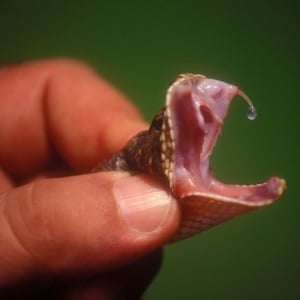
Scary pit vipers may need an image upgrade from being an ominous sign of something negative or having people flee when they see a snake, as now their venom might end up helping human heart patients, research suggests.
Taiwanese scientists say a blood thinner drug based on venom from the Wagler's pit viper was effective in mice, and might prove safer than current anti-clotting meds for humans one day.
The study was published in the journal Arteriosclerosis, Thrombosis and Vascular Biology.
The serpent-medicine connection isn't new, one cardiologist noted, since venom typically kills by disrupting the blood's clotting mechanisms.
Snakebites always an emergency
it is important to remember that most snakes aren't venomous, and when a venomous snake does bite, it is often not fatal. According to Health24 these bites can, however, cause permanent injuries to the affect area – usually a limb – and the occasional loss of life if infection does set in. Therefore, all snakebites should be considered as a medical emergency.
"Blood thinner medications have a long and storied history with snake venom," said Dr Satjit Bhysri, a heart specialist at Lenox Hill Hospital in New York City. In fact, "many current blood thinners are based on initial experiments from proteins found in snake venom," he added.
In the new study, a team led by Tur-Fu Huang, a pharmacology researcher at National Taiwan University, focused on the venom of the Tropidolaemuswaglerix snake – a Southeast Asian species known as Wagler's pit viper or the Temple viper.
The snake's venom contains a protein called trowaglerix, the researchers explained. Designing a molecule based on trowaglerix, Huang's group was able to block GPVI – a protein that sits on the surface of blood platelet cells and is crucial to allowing these cells to clump together and form clots.
Drug may have merit
When mixed with blood, the new compound prevented blood cells called platelets from clotting. Also, mice that received the drug had slower blood clot formation than untreated mice, but the treated mice did not bleed longer than untreated mice. Still, experiments in animals often don't translate to success in humans, so further research is needed.
Dr Kevin Marzo is head of cardiology at NYU Winthrop Hospital in Mineola, New York. Reviewing the findings, he agreed that the drug under development may have merit.
"Many of the lifesaving drugs used in the treatment of heart attack patients work by inhibiting platelets and preventing blood clotting. However, it is often at the cost of serious bleeding complications," he said.
"The potential development of a new agent based on snake venom that could have similar beneficial effects on preventing blood clotting, and potentially cause less bleeding side effects, is an exciting discovery that warrants future investigation," Marzo added.
Read more:




 Publications
Publications
 Partners
Partners















